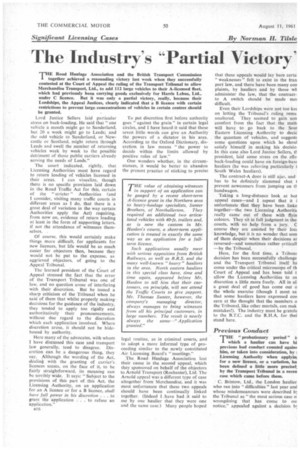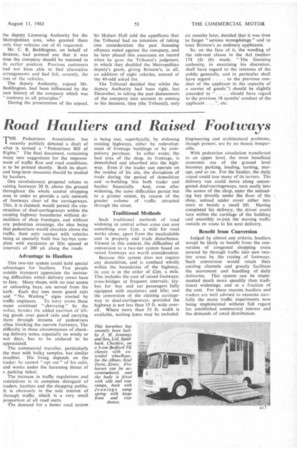The Industry's "Partial Victory'
Page 50

Page 51

If you've noticed an error in this article please click here to report it so we can fix it.
TsHE Road Haulage Association and the British Transport Commission together achieved a resounding victory last week when they successfully contested at the Court of Appeal the ruling of the Transport Tribunal to allow Merchandise Transport, Ltd., to add 112 large vehicles to their A-licensed fleet, which had previously been carrying goods exclusively for Harris Lebus, Ltd., under C licence. But it was only a partial victory, really, because their Lordships, the Appeal Justices, clearly indicated that a B licence with certain restrictions to prevent large concentrations of vehicles in certain centres should be granted.
Lord Justice Sellers laid particular stress on back-loading. He said that " one vehicle a month might go to Sunderland, but 20 a week might go to Leeds; and the odd vehicle to Sunderland, or Newcastle or Scotland, might return through Leeds and swell the number of returning vehicles week by week to the possible detriment of those public carriers already serving the needs of Leeds."
The court indicated, rightly, that Licensing Authorities 'must have regard to return loading of vehicles licensed in their areas. I can visualize, though there is no specific provision laid down in the Road Traffic Act for this, certain of the " stricter " Authorities (and I consider, visiting many traffic courts in different areas as I do, that there is a great deal of variation in the way certain Authorities apply the Act) requiring, from now on, evidence of return loading at least in the form of supporting letters. if not the attendance of witnesses themselves.
Of course, this would certainly make things more difficult, for applicants for new licences, but life would be so much easier for objectors then, because they would not be put to the expense, as aggrieved objectors, of going to the Appeal Tribunal.
The learned president of the Court of Appeal stressed the fact that the error of the Transport Tribunal was one of law, and no question arose of interfering with their discretion. But he issued a sharp criticism of the Tribunal when he said of them that whilst properly making decisions for the guidance of the industry. they tended to apply too rigidly and authoritatively their pronouncements. without due regard to the discretion which each application involved. Where discretion arose, it should not be hidebound by authority.
Here many of the advocates, with whom I have discussed this case and transport law generally, tend to disagree. Discretion can be a dangerous thing. they say. Although the wording of the Act, dealing with the granting of carrier's licences seems, on the face of it, to be fairly straightforward, its meaning can he terribly wide. It says: "Subject to the provisions of this part of this Act, the Licensing Authority, on an application for an A licence or for a B licence, shall hare full power in his discretion . . to grant the application . . . to refuse an application." To put discretion first before authority goes "against the grain" in certain legal circles, and I have heard it said that these seven little words can give an Authority the powers of a dictator in his area. According to the Oxford Dictionary, discretion, in law means "the power to decide within the limits allowed by positive rules of law."
One wonders whether, in the circumstances, it would be better to abandon the present practice of sticking to precise legal routine, as in criminal courts, and to adopt a more informal type of proceeding similar to the newly constituted Air Licensing Board's "meetings."
The Road Haulage Association lost their cause in the second appeal, which they sponsored on behalf of the objectors to Arnold Transport (Rochester), Ltd. The Arnold appeal was a different type of case altogether from Merchandise, and it was most unfortunate that these two appeals should have been continually linked together. (Indeed I have had it said to me by one haulier that they were one and the same case.) Many people hoped
that these appeals would lay bare certa " weaknesses " felt to exist in the tan port law, and there have been many con plaints, by hauliers and by those wt administer the law, that the contractto A switch should be made moi difficult.
Even their Lordships were not too kee on letting the Tribunal's ruling rema unaltered. They seemed to gain son comfort from the fact that the matt will have to go back to the Soul Eastern Licensing Authority to deck the quantum of vehicles, and suggeste some questions upon which he shoul satisfy himself in making his decisio In this case also Lord Justice Sellers, it president, laid some stress on the elte. back-loading could have on foreign-base hauliers (he was referring particularly South Wales hauliers).
The contract-A door is still ajar, and has to be definitely slammed shut t prevent newcomers from jumping on tibandwagon.
Taking a long-distance look at hot appeal cases—and I repeat that it i unfortunate that they have been linke together—the two Licensing Authoritit really came out of these with flyin colours. They sit in full judgment in the, courts, with no help from a jury. C course they are assisted by their Wei knowledge, but it is no wonder that som of them despair when their decisions ar reversed—and sometimes rather critical! --by the Tribunal.
Here, for the first time, a Tribunt decision has been successfully challenge and the Transport Tribunal itself ha come under the critical microscope of th Court of Appeal and has been told t allow the Licensing Authorities to us discretion a little more freely. All in al a great deal of good has come out c the whole exercise (though I must sa that some hauliers have expressed con cern at the thought that the members o the Tribunal, like other mortals, can mak mistakes!). The industry must be gratein to the B.T.C. and the R.H.A. for thei stand here.
Previous Conduct
"probationary period" 'eb a haulier can have hi
previous bad conduct counted spins him, or taken into consideration, by ; Licensing Authority when applyin; for a new licence, or a variation, ha been defined a little more precise': by the Transport Tribunal in a rem' case which came before them.
C. Bristow, Ltd., the London haulier who ran into "difficulties" last year and whose misdemeanours were described b] the Tribunal as "the most serious case o wrongdoing that has come to ou notice," appealed against a decision b■ the deputy Licensing Authority for the Metropolitan area, who granted them only four vehicles out of 41 requested.
Mr. C. R. Beddington, on behalf of Bristow, had pointed out that it was time the company should be restored to its earlier position. Previous customers had not been able to find alternative arrangements and had felt, severely, the loss of the vehicles.
The deputy Authority, argued Mr. Beddington, had been influenced by the past history of the company which was "contrary to all principles."
During the presentation of the appeal, Sir Hubert Hull told the appellants that the Tribunal had no intention of taking into consideration the past licensing offences noted against the company, and he. later placed this assurance on record when he gave the Tribunal's judgment, in which they doubled the Metropolitan deputy's grant, giving Bristow's, in all, an addition of eight vehicles, instead of the 40-odd asked for.
The Tribunal decided that whilst the deputy Authority had been right, last December, in taking the past demeanours of the company into account in corning to his decision, they (the Tribunal), only six months later, decided that it was time to forget "serious wrongdoings" and to treat Bristow's as ordinary applicants.
So, on the face of it, the wording of the relevant clause in the Act (section 174 (4) (b) reads: "The licensing authority, in exercising his discretion, shall have regard to the interests of the public generally, and in particular shall have regard . . . . to the previous conduct of the applicant in the capacity of a carrier of goods.") should be slightly amended to " . . should have regard to the previous 18 months' conduct of the applicant . ", etc,




















































































































